|
|
|
Sort Order |
|
|
|
Items / Page
|
|
|
|
|
|
|
| Srl | Item |
| 1 |
ID:
137605
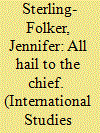

|
|
|
|
|
| Summary/Abstract |
Analytical pluralism in IR theory is a welcome development, yet it may also play a role in reifying our contemporary liberal world order. While there is clearly greater analytical diversity in the IR discipline today than in the latter half of the twentieth century, it is a diversity that is contained within the boundaries of acceptable liberal discourse. As a result, it does not constitute a challenge to dominant disciplinary ways of knowing and being. IR theory may enjoy a circumscribed version of analytical diversity in which multiple voices may speak but power does not listen. This possibility and its implications are considered, with particular attention paid to liberalism and positivism as the dominant analytical project of the contemporary moment.
|
|
|
|
|
|
|
|
|
|
|
|
|
|
|
|
| 2 |
ID:
178801
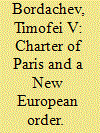

|
|
|
|
|
| Summary/Abstract |
The end of the Cold War opened up new vistas for building a new
international order in Europe, free of dividing lines. The more so since
the liberal world order, which emerged due to the evolution of the global
order in the field of security, on the one hand, and the rules, norms, and
practices established within the community of Western countries in 1945-
1991, on the other hand, was formally the most successful combination of
the effects of such categories as the balance of power and international
institutions. At the global level, this combination for a long time made
it possible to avoid revolutionary situations that might have been
caused by utter dissatisfaction of one or several major powers with their
position. However, in Europe, where the institutional basis of international interaction was most developed, the rules of the liberal world order
brought about significant distortions in favor of one of the participants
in this interaction—the European Union, which acted as an instrument for
increasing individual capabilities of major Western European countries.
This happened because the factor of military capabilities was excluded
from the overall balance of power of the main actors. Since for a long time
after the end of the Cold War Russia was limited in all factors of power
except for the military one, its position in relations with the EU was weak,
which is why its interests and values were ignored in building an EU-led
European order. This eventually paralyzed the entire system of multilateral
interaction in Europe, which, along with the shift of the global center of
power competition towards Asia, considerably marginalized the European
space in global affairs.
|
|
|
|
|
|
|
|
|
|
|
|
|
|
|
|
| 3 |
ID:
163308
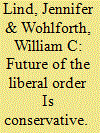

|
|
|
|
|
| Summary/Abstract |
The liberal world order is in peril. Seventy-five years after the United States helped found it, this global system of alliances, institutions, and norms is under attack like never before. From within, the order is contending with growing populism, nationalism, and authoritarianism. Externally, it faces mounting pressure from a pugnacious Russia and a rising China. At stake is the survival of not just the order itself but also the unprecedented economic prosperity and peace it has nurtured
|
|
|
|
|
|
|
|
|
|
|
|
|
|
|
|
| 4 |
ID:
147725


|
|
|
|
|
| Summary/Abstract |
Any serious discussion of the Russian foreign policy inevitably begins with a question about developments and trends in the world as a whole. These days, virtually every work on Russia's foreign policy is predicated on the notion that there is a systemic crisis of the liberal world order. For some, this crisis is a tragedy of historical scale; for others, it is a long-awaited confirmation of old prophecies; and for still others, an unexpected gif. Whatever diagnostic methods used, the principal symptoms of the crisis are as follows.
|
|
|
|
|
|
|
|
|
|
|
|
|
|
|
|
| 5 |
ID:
172558
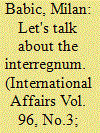

|
|
|
|
|
| Summary/Abstract |
The liberal international order (LIO) is in crisis. Numerous publications, debates and events have time and again made it clear that we are in the midst of a grand transformation of world order. While most contributions focus on either what is slowly dying (the LIO) or what might come next (China, multipolarity, chaos?), there is less analytical engagement with what lies in between those two phases of world order. Under the assumption that this period could last years or even decades, a set of analytical tools to understand this interregnum is urgently needed. This article proposes an analytical framework that builds on Gramscian concepts of crisis that will help us understand the current crisis of the LIO in a more systematic way. It addresses a gap in the literature on changing world order by elaborating three Gramsci-inspired crisis characteristics—processuality, organicity and morbidity—that sketch the current crisis landscape in a systematic way. Building on this framework, the article suggests different empirical entry points to the study of the crisis of the LIO and calls for a research agenda that takes this crisis seriously as a distinct period of changing world orders.
|
|
|
|
|
|
|
|
|
|
|
|
|
|
|
|
| 6 |
ID:
090678
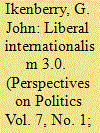

|
|
|
|
|
| Publication |
2009.
|
| Summary/Abstract |
Liberal international order-both its ideas and real-world political formations-is not embodied in a fixed set of principles or practices. Open markets, international institutions, cooperative security, democratic community, progressive change, collective problem solving, the rule of law-these are aspects of the liberal vision that have made appearances in various combinations and changing ways over the last century. I argue that it is possible to identify three versions or models of liberal international order-versions 1.0, 2.0, and 3.0. The first is associated with the ideas of Woodrow Wilson, the second is the Cold War liberal internationalism of the post-1945 decades, and the third version is a sort of post-hegemonic liberal internationalism that has only partially appeared and whose full shape and logic is still uncertain. I develop a set of dimensions that allow for identifying different logics of liberal international order and identify variables that will shape the movement from liberal internationalism 2.0 to 3.0.
|
|
|
|
|
|
|
|
|
|
|
|
|
|
|
|
| 7 |
ID:
159469
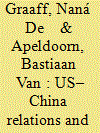

|
|
|
|
|
| Summary/Abstract |
The future of liberal internationalism will be influenced increasingly by the re-emergence of China as a major power on the world stage and by the way the United States is reacting to China's growing influence. In this article, we discern three possible scenarios: one of inevitable conflict, one of gradual co-optation and a hybrid scenario of coexistence. We argue that in order to understand the development of the Sino-US relationship and the sometimes-contradictory outcomes and dilemmas this generates, we need to take into account the social and domestic sources of foreign policy within these two major powers, and the distinctive state–society models that they represent. Crucially, this includes how the domestic political economy is dynamically interrelated with the global political economic context. In our approach, foreign policy elites form a key nexus here and a vital prism through which to analyse foreign policy strategies. From this critical political economy perspective, we will describe how China's re-emergence as a world power is partly shaped by its distinctive ‘statist’ state–society model, to then analyse US strategy towards rising China through the lens of the close nexus between America's corporate elite and the state. In our concluding section we will return to the three scenarios. Based on the findings presented, and in light of the radical shift that seems to be occurring due to the Trump presidency, we will reflect on the likelihood of these scenarios, the future of the liberal world order and conclude with a research agenda.
|
|
|
|
|
|
|
|
|
|
|
|
|
|
|
|
| 8 |
ID:
141745


|
|
|
|
|
| Summary/Abstract |
U.S. strategists have generated a torrent of diverse ideas for how America should respond to the ascent of China. Consideration of the full range of strategic options available to future presidents broadly offers a means of forecasting whether Sino-American relations will evolve in an amicable or antagonistic direction. This article identifies six prospective choices of U.S. strategy toward China, each advancing unique assumptions of Chinese ambitions and capabilities, and appropriate means for checking them. While diverse in tactics, all are nevertheless united in a deeply embedded suspicion of China's long-term intentions and a commitment to thwarting any challenge to American preeminence in Asia. As tensions with China escalate, the United States will likely opt for provocative strategies that emphasize a strengthened military footprint and seek assurances of Beijing's peaceful intentions by pushing for democratization in China and pressing for its further integration in the liberal world order.
|
|
|
|
|
|
|
|
|
|
|
|
|
|
|
|
|
|
|
|
|